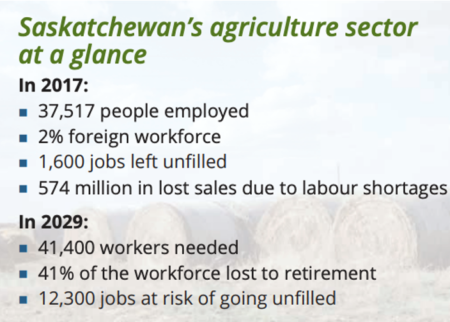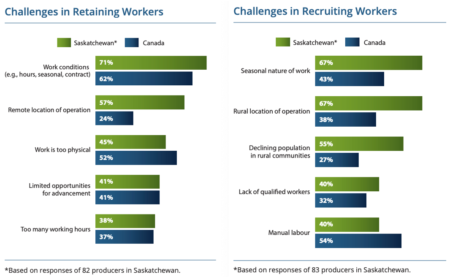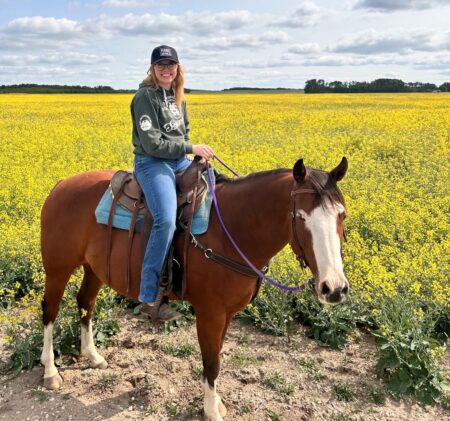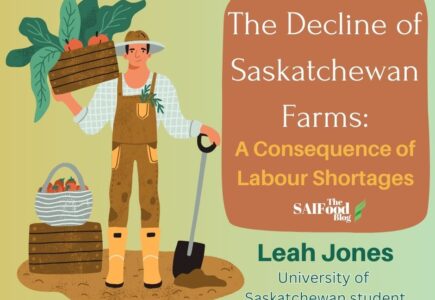By Leah Jones
University of Saskatchewan student
Introduction
Saskatchewan, often referred to as the “breadbasket of Canada,” has long been a vital contributor to the nation’s agricultural sector. With its vast expanses of fertile land, the province has been a farming stronghold for generations. However, a concerning trend has emerged – a significant decrease in the number of farms, primarily due to labour shortages. In this blog, I’ll delve into the factors behind this decline and explore potential solutions.
The Labour Shortage Challenge
One of the most pressing issues facing Saskatchewan farms today is the scarcity of labour. This concept applies to both grain and livestock farming. Traditionally, these farms have relied on a combination of skilled and seasonal labour to tend to crop or livestock, maintain equipment and handle various farm operations. However, as the rural population continues to age, and young people increasingly pursue non-agricultural careers, finding and retaining skilled farm workers has become a daunting challenge for the owners and operators of farming and livestock operations. A Saskatchewan farmer noted “As my dad’s generation moves into retirement, we face a growing threat: reduced access to skilled labour.” This image taken from AGRI-Labour Market Information notes is the projected increase of workers needed in Saskatchewan’s agriculture sector by 2029.

Factors Contributing to Labour Shortages
Several factors have converged to create the perfect storm of labour shortages in Saskatchewan’s farming communities:
- Aging Workforce: The average age of farmers in Saskatchewan has been steadily increasing. According to the most recent 2021 Canada Census of Agriculture, the average age of farm operators is 56 years of age, and increasing. As older farmers retire, there are fewer young individuals willing to take up the mantle due to the physically demanding and financially risky nature of farming.
- Urban Migration: Many young people are migrating to urban centres in search of job opportunities, leaving rural areas with a dwindling workforce.
- Seasonal Nature of Farming: Agriculture often involves seasonal work, making it less attractive to those seeking year-round employment and job security.

The decline in available labour has tangible effects on agricultural production in Saskatchewan. Farms are unable to operate at full capacity, leading to reduced planted crops, which then leads to reduced crop yields and livestock production. This not only affects local food supplies but also has broader economic implications as Saskatchewan is a significant contributor to Canada’s agricultural exports. The Government of Saskatchewan stated, “In 2022 alone, Saskatchewan exported more than $3.3 billion in each of the four key crop sectors; cereal, grains, oilseeds, pulses and edible oils.”
Challenges in Finding Skilled Workers
Finding skilled agricultural workers has become increasingly challenging. Skilled labour is essential for efficient farm operations, and the lack thereof can result in decreased productivity and increased operational costs. One way Saskatchewan farms are adapting to labour shortages is by embracing technological innovations. Automated machinery, precision agriculture, and data analytics have become integral parts of modern farming. While these technologies can mitigate labour shortages to some extent, they also require skilled operators and substantial investments. Oftentimes the necessary funds are difficult to acquire for these farms.
Solutions to Address Labour Shortages
To combat the difficulty of farming in this generation in Saskatchewan several solutions are being explored:
- Encouraging young people to pursue agricultural education and training programs can help bridge the skills gap. This can include pursing anything from an agriculture related university degree, to getting your 1A truck driving license. This does not include the on-site education you would get on the farm you are hired.
- Attracting skilled labour from other regions or countries can supplement the local workforce.
- Governments can provide more financial incentives, grants, and subsidies to make farming more attractive and profitable for young individuals. In the current world, most government subsides can be difficult to acquire, or have a strict screening process to determine if you are eligible.
- Farmers can collaborate to share resources and labour, making it more feasible to operate smaller start-up farms and help sustain the larger farms.
Conclusion
The decline of farms in Saskatchewan due to labour shortages is a critical issue that has far-reaching consequences for the nation’s economy and food security. Addressing this challenge requires a multi-faceted approach, including investments in agricultural education, immigration policies that support the recruitment of skilled labour, and government initiatives to make farming a more appealing career choice. Only by addressing these issues can Saskatchewan farms thrive and continue to play their crucial role in feeding the globe.
Biography
 My name is Leah Jones, and I am a third-year student at the University of Saskatchewan. I am currently pursuing a bachelor’s degree in Agribusiness, with plans to enter the industry back around my hometown of Kinistino, Saskatchewan upon graduation. My love for agriculture has always been present having a background in both grain and livestock operations and having the opportunity to work with many companies within the agriculture industry. My most recent job experience was with Bayer CropScience, where I worked as a Territory Sales Associate and had the amazing opportunity to work with growers surrounding my hometown for the summer. My desire to work within the industry is ever-growing and I am optimistic and excited about future of Saskatchewan agriculture!
My name is Leah Jones, and I am a third-year student at the University of Saskatchewan. I am currently pursuing a bachelor’s degree in Agribusiness, with plans to enter the industry back around my hometown of Kinistino, Saskatchewan upon graduation. My love for agriculture has always been present having a background in both grain and livestock operations and having the opportunity to work with many companies within the agriculture industry. My most recent job experience was with Bayer CropScience, where I worked as a Territory Sales Associate and had the amazing opportunity to work with growers surrounding my hometown for the summer. My desire to work within the industry is ever-growing and I am optimistic and excited about future of Saskatchewan agriculture!

